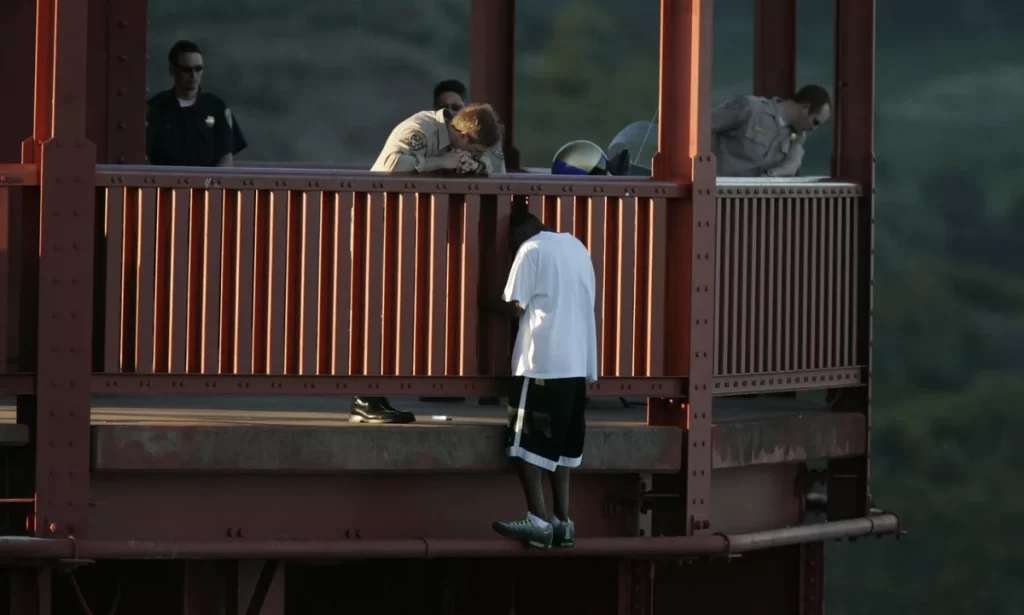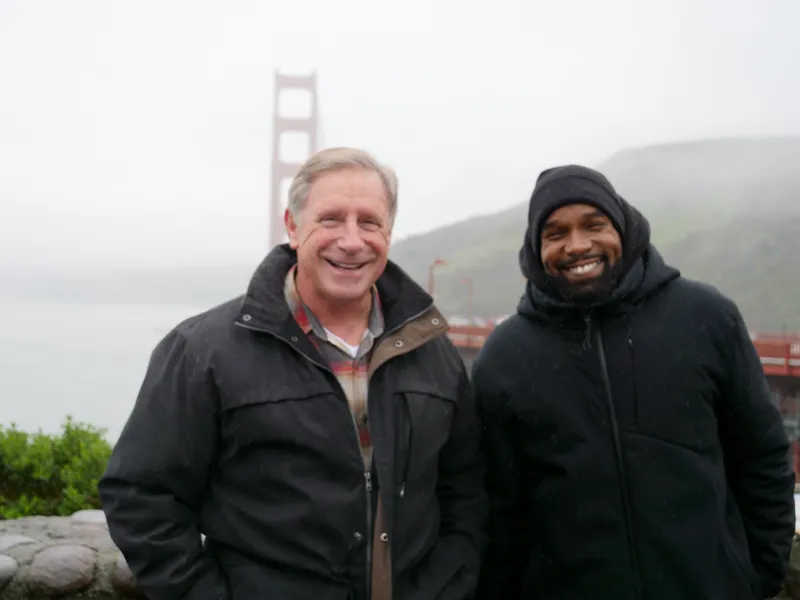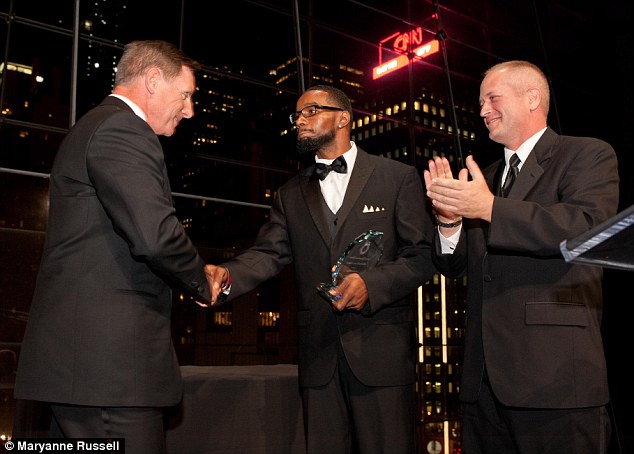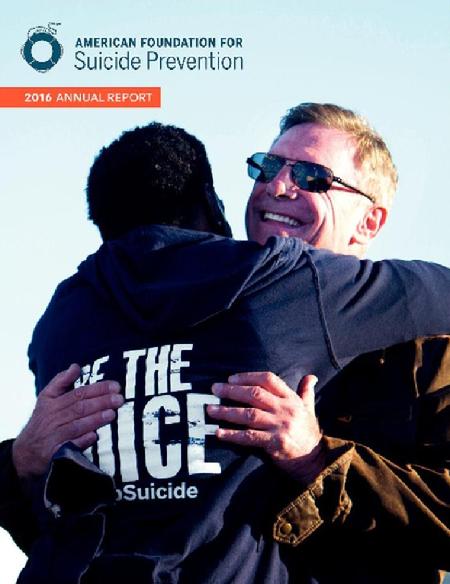10 Years Later, A Pair Of Strangers Revisit A Leap Not Taken
Ten years ago Kevin Berthia lived in the San Francisco Bay area. He had an infant daughter who had been born premature, and the medical costs for her care climbed to nearly $250,000. He couldn’t see a way out of debt.
Berthia fell into a deep depression and went to the Golden Gate Bridge.
“Before March 11, 2005, I never even went to the bridge,” the 32-year-old said during a recent visit to StoryCorps. “I didn’t even know how to get there. I had to ask for directions.”
California Highway Patrol Officer Kevin Briggs was there that day, too.
“… I see you standing on the sidewalk,” 52-year-old Briggs said to Berthia. “You looked at me and went over that rail and I thought you were gone.”
Berthia says he “just got on that railing and turned around.”
“I was overwhelmed with everything,” he explained. “It’s like everything that I ever was bothered by, everything that I was ever dealing with came up on one day. And I just felt like a failure. All I gotta do is lean back and everything is done. I’m free of all this pain.”

Briggs thought he seemed angry.
“I was just mad at myself for being in that situation and I was embarrassed,” Berthia said. “But somehow the compassion in your voice is what allowed me to kinda let my guard down enough for us to have a conversation.
“We talked for 92 minutes about everything that I was dealing with. My daughter, her first birthday was the next month. And you made me see that if nothing else, I need to live for her,” Berthia said.
Briggs and others took him to a hospital, and the two didn’t see each other again for years.
“I spent eight years not thinking about the bridge. I didn’t wanna talk about it ever again,” Berthia said.
Briggs said he usually didn’t want to meet people he had met under those circumstances.
“But your mother wrote me a note and I did contact her,” the now-retired officer said.
Berthia, who wasn’t sure how he would feel once he met Briggs, said: “When I first saw you, it was just like two old friends that haven’t seen each other in a while. That was the first time I was able to talk about everything that happened that day.”
Briggs reassured him that it was OK to talk about it.

“I’ve found that out with my own depression and things that I kept bottled up for decades,” he told Berthia, who acknowledged the bond they shared.
“You know, we’ve been through similar things in our lives and I’ve never been around anybody that’s seen me at a more vulnerable state,” Berthia said. “The greater picture is that I need to be here for my daughter. You know, she’s 10 now and, had you not been there, I wouldn’t get to see her grow up.

“And, you know, I don’t trust a lot of people,” he said. “So for you to never judge me and just to have that trust, that’s what keeps us afloat and different from any other friendship.”
Audio produced for Morning Edition by Jud Esty-Kendall.
StoryCorps is a national nonprofit that gives people the chance to interview friends and loved ones about their lives. These conversations are archived at the American Folklife Center at the Library of Congress, allowing participants to leave a legacy for future generations. source
read the whole story here Man Who Was Saved from Taking His Own Life Now Helps People Battling Mental Health Issues
In March of 2005, Kevin Berthia (pictured above right) was going through a tough time.
His daughter was born premature the year before and medical costs for her care climbed to nearly $250,000.
He couldn’t see a way out of debt, so he fell into a deep depression and decided to end his life at the Golden Gate Bridge.
That’s where he met retired California Highway Patrol Officer Kevin Briggs, who intervened and talked him down.
They spoke about that day at StoryCorps in San Francisco. source
A Compelling 2015 Presentation on Suicide-
Heroic First Responder & Grateful Survivor
TEN YEARS AGO in March 2005, Kevin Berthia wanted to take his life. He had climbed over the railing of the Golden Gate Bridge and was prepared to take a fatal jump into the San Francisco Bay when he heard a voice calling out to him from above.
It was the voice of California Highway Patrol (CHP) Officer Kevin Briggs. The two talked for 60 life-changing minutes before Berthia decided to climb back up the bridge and give life another chance.
NPR captures a poignant conversation between Kevin Briggs and Kevin Berthia
“Ten Years Later”. listen below..
|
KEVIN BRIGGS
|
He provides public speaking and teaching at conferences and law enforcement departments across the country, including the FBI, and he consults and advises major companies and corporations. He is the 2013 recipient of the Outstanding Officer Award, Public Service Award presented by the American Foundation for Suicide Prevention, California State Senate Resolution for Public Service, and Jefferson Award for Public Service.
“People who come to jump don’t necessarily want to die,” explains Briggs, 50, who calmly introduces himself just a few feet away to the despondent person, in his dedication often standing for hours in bone-chilling wind, rain, or heavy fog.
“I try to find out what brought them to this point,” says Briggs, a cancer survivor and father of two boys. “If I can get them to break down, that’s a good sign. It shows they’re listening and thinking. If someone says they have no plan for tomorrow, I say, ‘OK, let’s make one.’ ”
His story and experiences have been featured in The New Yorker Magazine, Men’s Health Magazine, NPR’s Bob Edwards Radio Show,NBC Nightly News with Brian Wilson, The Steve Harvey Show, and People Magazine.
|
KEVIN BERTHIA
|
Kevin is living each day in gratitude after Sgt. Kevin Briggs talked him back over the ledge of The Golden Gate Bridge in 2005. Kevin Berthia has since become a Suicide Prevention Advocate, encouraging people to talk through their problems rather than think about ending their lives. Kevin believes that depression may be a part of you, but it is not who you are. He lives in Northern California and has since welcomed a third child to the world. Berthia explains that the connection between himself and Briggs is more than just a CHP officer and a man who was trying to commit suicide and audience members can now experience their special bond that was forged in those 60 minutes on the bridge.
Sgt. Kevin Briggs was the patrol officer whose compassionate voice and listening ear prevented Berthia from taking his own life at the Golden Gate Bridge 10 years ago. Briggs is called the Guardian of the Golden Gate Bridge and has saved hundreds of lives, spending up to 7 hours talking on the scene to bring a suicide attempter back over the rail. Briggs is dedicated to stopping the suicide epidemic and committed to destigmatizing this crisis.
Kevin Berthia is a grateful suicide survivor and suicide prevention advocate. Kevin was born with a genetic major depression disorder that he inherited from his biological mother. In 2005 at the age of 22, Kevin attempted to take his own life by jumping from the Golden Gate Bridge. After jumping the railing, he stood on a 4 inch narrow cord about 220 feet in the air. For 96 minutes, with nothing to stop him from falling except first responder Sgt. Briggs, who eventually talked him back over the railing.
Kevin Berthia and Kevin Briggs reunited 8 years later when Berthia presented the Public Service Award to the man who saved him at an American Foundation for Suicide Prevention event.
“I had never dealt with any of the problems in my life, and that morning I was overwhelmed by it all…I parked and walked towards the bridge. As I jumped over the railings I heard someone say: “Hey, wait a minute.” I was convinced I was going to end my life , but at the last moment his voice made me stop and grab the railings. That’s what you see in the picture – me standing on the ledge. I now know that was Officer Briggs (centre, leaning on the railings). He snapped me back to reality. I was on that ledge for 92 minutes, and for 89 of those I just talked. I got everything out and he listened without judging.
I have since become a suicide prevention advocate, encouraging people to talk through their problems rather than think about ending their lives. I now know that depression is a part of me but not who I am. I have three children and a new partner with whom I will spend the rest of my life. Now is the happily ever after.”
-How does the presentation work?
Briggs presents first about his experiences in helping to convince more than 200 people on the precipice of death not to take their lives. Briggs then introduces Berthia, who presents on his battle with depression and second chance at life.
Briggs and Berthia share the stage at the conclusion to discuss their special bond… and audiences love seeing the transformation from past crisis to current inspiration as dual speakers united for suicide prevention. After the presentation, both Berthia and Briggs answer questions together. The presentation is 100 minutes to include Q&A. This is a unique opportunity for the audience to question both an attempt survivor and law enforcement officer side-by-side and makes for a dynamic conclusion.
-How will this impact the audience?
Having both speak opens up the opportunity to make this a community-wide event. This event will attract many different sectors from the local community.
The speakers present a powerful message of recovery and prevention that visibly moves the audience. It is not uncommon to have members in the audience who are in need finally reach out for help through counseling or local crisis support centers.
Audiences regularly give standing ovations, wait in line for book signings or simply linger after the presentation for a hug and to further connect with Briggs and Berthia. This is a presentation that has the audience thinking and talking about it for many months to follow.
Phyllis knows how to navigate the logistics of getting the speakers to your event including dealing with budget issues, travel arrangements and lodging. She is very creative in finding a solution that works for your department and is committed to bringing this important message of prevention to your community. source
He has talked more than 200 people off the ledge of the Golden Gate Bridge
As part of his job, this California Highway Patrol Officer talks to suicidal people

Kevin Briggs has been called the “Guardian of the Golden Gate Bridge”.
He got the nickname while working as a California Highway Patrol officer for more than 23 years. Briggs spent most of that time positioned on the Golden Gate Bridge.
But the job turned out to be a lot more than he originally thought he was signing up for.
When Briggs started out in 1994, he was trained to handle traffic incidents but had never received training on how to deal with people contemplating suicide.
He didn’t know at the time how pervasive the issue of suicide on the bridge was.
“There were four to six cases of suicidal folks on the bridge each and every month. And I had no idea about this, and I grew up in Marin County, which connects to San Francisco via that Golden Gate Bridge…I had no training to handle these types of situations.”
Briggs says in his first encounter with a suicidal person he “did about everything wrong that you could”.
“In the back of my mind I was thinking, ‘Am I responsible if she does jump? What happens here? I had no training in this. This is a really bad scene.’…I was afraid, I didn’t know how to handle that situation.”
Briggs says he learned a lot from the encounters that followed.
“I think my approach right from the start was wrong. Just to walk up right to those folks and start talking with them. Now what I do is I stand back and I’ll just introduce myself. I’ll say ‘Hi I’m Kevin’ or ‘I’m Kevin with the Highway Patrol, is it okay, is it alright if I come up and speak with you for a bit?’ I want to get their permission and empower them.”
Since then, Kevin has talked to more than 200 people standing on the edge of the bridge.
One of those people is Kevin Berthia.
“He was very, very, very angry,” says Briggs, “And he wanted nothing to do with me. And he kept yelling at me ‘Stay back! Stay back, if you come one step further I’m jumping!’ And he was very serious about this. In my mind, if I took one step further then he was gone.”
The two spoke for more than 90 minutes about the problems Berthia was facing in his life. Briggs says he only spoke for about four or five minutes during the entire conversation. Eventually, Berthia decided to come back over and Briggs helped him over the edge and congratulated him.
“I asked him… ‘What happened here? What was the turning point in this? What did I do that helped this situation? And what did I do that wasn’t so good that hurt this situation?’ And all he told me was, ‘You listened. You let me speak, and you listened.’ And that’s all he was looking for and that’s all that many, many people are looking for is someone to listen.”
Briggs says he thinks people contemplating suicide don’t want to hear things like, “You’ll get over it,” and, “It’s going to get better”.
“What I believe, personally, they want to hear is, ‘Yeah, it is tough’.”
“I try to explain to them, wow that sounds really tough. And normalize their situation. That’s a real big one, is to try to normalize their situation. You know, ‘Wow, what you’re going through is a whole lot of stuff and that’d be tough on anybody. I think anyone going through all that might be thinking about suicide’.
“It takes a lot of courage to be over that rail. It takes a lot of courage. But it also takes a lot of courage to come back and face the reality that is with them right now. But there is a brighter side to this, and it can happen, and it might take a long time and a lot of work. But life is beautiful and, you know, it is worth living.”
Briggs says that although he can’t fix any of the issues that people are dealing with, it is important to listen and to try to understand what they are going through.
Briggs retired from the California Highway Patrol in 2013, and he now works in suicide prevention. source
